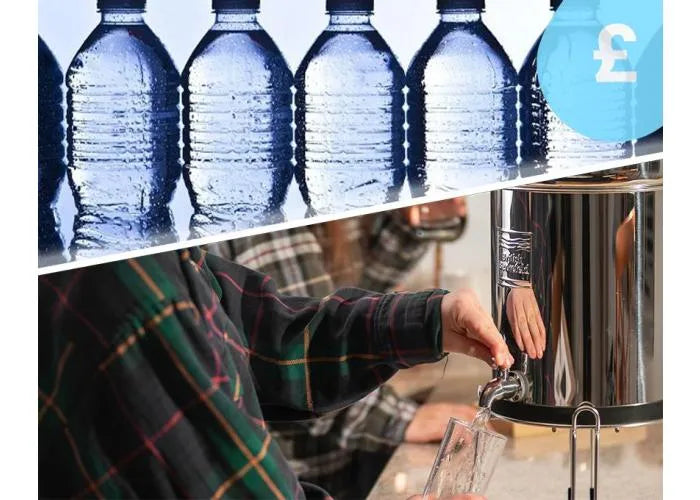The Importance of Water: A Life-Sustaining Resource
Water is a crucial resource, indispensable in our everyday lives. The perception of the merits and pitfalls of bottled water vs filtered water constitute one of the more significant issues in domestic water use and management. Health and safety concerns play a significant role in deciding which type of water source will be used as drinking water, since the quality of tap water continues to raise concerns among the public1. Even though tap water is perfectly safe to drink, many are concerned about it is make up or simply prefer better tasting water only achieved with filtration or buying a mineral water.
The Hidden Costs of Bottled Water: An Environmental Perspective
The global consumption of bottled water has been consistently on the rise, particularly in developed nations where tap water is safe to drink. The steady growth in the bottled water industry owes much to marketing and branding strategies. These strategies leverage the deep-seated cultural connotations of water, such as its representation of natural power, alongside the symbolism of modern technology and the mastery over water through purification systems2.
The real cost of bottled water extends beyond just supply costs, such as energy and packaging, which are 240 to 10,000 times pricier per litre than tap water. It also includes environmental costs like plastic waste, much of which ends up in landfills or contributes to oceanic microplastic concentrations. In fact, the environmental toll of bottled water, encompassing energy needs, CO2 emissions, and waste production, is reportedly 100 times greater than that of tap water.
Health Risks of Bottled Water: Microplastics and More
Moreover, concerns over the environmental and health impacts of bottled water are escalating. A recent study suggested that bottled water consumers could ingest up to 90,000 plastic particles annually, compared to 4,000 for tap water drinkers. The World Health Organisation has even called for further research into this issue.
The cost of bottled water does not stop at environmental or health impacts; it also hits consumers' wallets. As per Harvey Water Softeners, the average cost of tap water in the UK is 0.1 pence per litre, whereas a litre of bottled water costs 65p. The profit margins on bottled water are also substantial, ranging from 50% to 200%.
The Rise of In-Home Water Treatment Systems: An Alternative to Bottled Water
The use of bottled water is not the only alternative for households dissatisfied with the quality and or taste of their tap water. There is a rapidly expanding market for in-home water treatment systems that, using sophisticated technologies, can substantially improve not only the organoleptic properties of household flows, but also their overall quality8. These systems appear as an alternative to bottled water, but may also be convenient for other household uses, such as washing fruit and vegetables, especially in areas with high water hardness9. The reality is that filtered tap water using in-home water treatment systems can be an effective substitute for bottled water consumption.
The Financial Benefits of Using Water Filters: A Case Study
Allow us to illustrate the extent of your potential savings when you opt for a water filter to fulfil your hydration requirements, rather than needlessly spending money on bottled water.
The NHS (National Health Service) recommends that people should drink a minimum of 8 glasses of water per day, and that is just if you are inactive. For a family of four, that is approximately 9 litres a day. However, relying on 12 500ml plastic bottles can be costly. Assuming a case of water costs about £6 (even more for fancy imported brands), at 40 pence per bottle, a family of four would spend:
£0.40 x 5.3 bottles/person = £2.13 x 4 people = £8.53 x 365 (days/year) = £3,114.67
Now let us compare that to using the Doulton HIP Biotect Ultra Inline water filter.
The Doulton HIP Biotect Ultra Inline water filter is an excellent investment at £175, This price not only covers the pillar tap but also includes a Doulton Biotect Ultra filter which itself is worth £35. It’s a fantastic deal that offers excellent value for money. The only extra expense throughout the 12 months will be for the replacement Biotect Ultra filter. Additionally, buying a couple of £10 water bottles per person would amount to £80 annually. As tap water in the UK costs about 1p per litre according to Harvey Water Softeners, the yearly cost of using a water filter from Doulton for a family of four would be:175 (filter) + £35 (replacement filter) + £80 (water bottles) + £32.85 (3,285 litres tap water) = £322.85
The Doulton HIP Biotect Ultra Inline Water Filter: An Investment Worth Making
By switching from bottled water to a tap water using a water filter from Doulton, a family of four can potentially save £2,791.82 per year (£3,114.67 - £322.85).
References:
- March, H., Garcia, X., Domene, E., & Sauri, D. (2020). Tap water, bottled water, or in-home water treatment systems: Insights on household perceptions and choices. Water, 12(5), 1310.
- March, H., Garcia, X., Domene, E., & Sauri, D. (2020). Tap water, bottled water, or in-home water treatment systems: Insights on household perceptions and choices. Water, 12(5), 1310.
- Font-Ribera, L.; Colomer Cotta, J.; Gómez-Gutiérrez, A.; Villanueva, C.M. Trihalomethane concentrations in tap water as determinant of bottled water use in the city of Barcelona. J. Environ. Sci. 2017, 58, 77–82.
- Avio, C.G.; Gorbi, S.; Regoli, F. Plastics and microplastics in the oceans: From emerging pollutants to emerged threat. Mar. Environ. Res. 2017, 128, 2–11.
- Parag, Y.; Roberts, J. A battle against the bottles: Building, claiming, and regaining tap-water trustworthiness. Soc. Nat. Resour. 2009, 22, 625–636.
- Cox, K.D.; Covernton, G.A.; Davies, H.L.; Dower, J.F.; Juanes, F.; Dudas, S.E. Human consumption of Microplastics. Environ. Sci. Technol. 2019, 53, 7068–7074.
- World Health Organization (WHO). Microplastics in Drinking Water; WHO: Geneva, Switzerland, 2019.
- Mackey, E.D.; Davis, J.; Boulos, L.; Brown, J.C.; Crozes, G.L. Consumer Perceptions of Tap Water, Bottled Water and Filtration Devices; IWA Publishing: London, UK, 2003.
- Lanz, B.; Provins, A. The demand for tap water quality: Survey evidence on water hardness and aesthetic quality. Water Resour. Econ. 2016, 16, 52–63.






